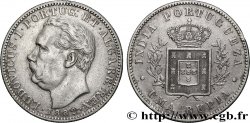fwo_946923 - PORTUGIESISCH-INDIEN 1 Rupia Charles Ier (Carlos) 1903
70.00 €
Menge
In den Warenkorb

Type : 1 Rupia Charles Ier (Carlos)
Datum: 1903
Prägemenge : 200000
Metall : Silber
Der Feingehalt beträgt : 920 ‰
Durchmesser : 30,5 mm
Stempelstellung : 6 h.
Gewicht : 11,67 g.
Rand cannelée
Kommentare zum Erhaltungszustand:
Monnaie ayant été nettoyée
Vorderseite
Titulatur der Vorderseite CARLOS I REI DE PORTUGAL // V.ALVES // 1904.
Beschreibung Vorderseite portrait à droite de Charles Ier roi du Portugal.
Rückseite
Titulatur der Rückseite INDIA PORTUGUESA // UNA RUPIA.
Beschreibung Rückseite armes couronnées du Portugal entre un rameau d’olivier et un rameau de chêne.
Kommentare
Les premiers pas des Portugais dans la péninsule date de 1498 avec l’arrivée de vasco de Gama à Cochin. Ils établissent de nombreux comptoirs. En 1947, ils refusent de céder ces territoires au nouvel état indépendant d’Inde. En 1954, des irréguliers indépendantistes prennent le pouvoir des enclaves de Dadra et Nagar Haveli. En décembre 1961, L'Inde envahit Goa, Daman et Diu. Il faudra attendre la Révolution des Oeillets pour que le gouvernement portugais en reconnaisse l’indépendance. .
The Portuguese first entered the peninsula in 1498 with the arrival of Vasco da Gama in Cochin. They established numerous trading posts. In 1947, they refused to cede these territories to the newly independent state of India. In 1954, pro-independence irregulars seized power in the enclaves of Dadra and Nagar Haveli. In December 1961, India invaded Goa, Daman, and Diu. It was not until the Carnation Revolution that the Portuguese government recognized their independence.
The Portuguese first entered the peninsula in 1498 with the arrival of Vasco da Gama in Cochin. They established numerous trading posts. In 1947, they refused to cede these territories to the newly independent state of India. In 1954, pro-independence irregulars seized power in the enclaves of Dadra and Nagar Haveli. In December 1961, India invaded Goa, Daman, and Diu. It was not until the Carnation Revolution that the Portuguese government recognized their independence.








 Berichten über einen Fehler
Berichten über einen Fehler Die Seite drucken
Die Seite drucken Teilen meiner Auswahl
Teilen meiner Auswahl Stellen Sie eine Frage
Stellen Sie eine Frage Einlieferung/Verkauf
Einlieferung/Verkauf
 Details
Details










